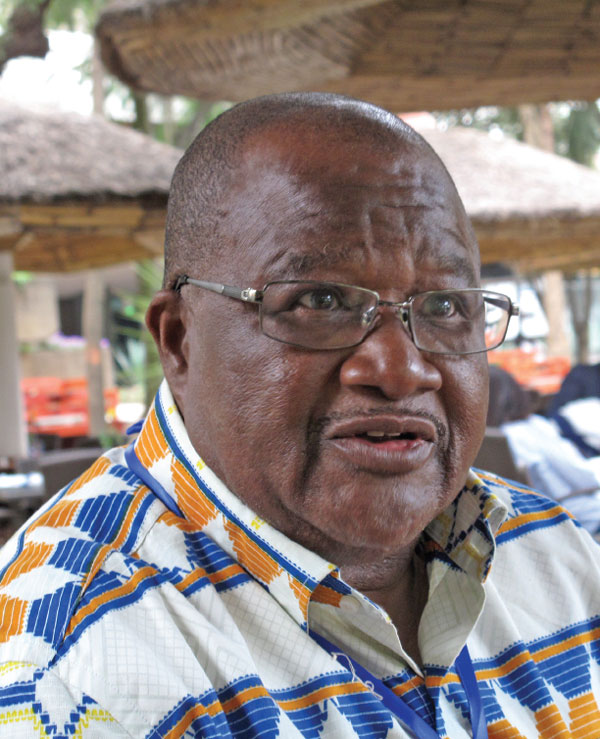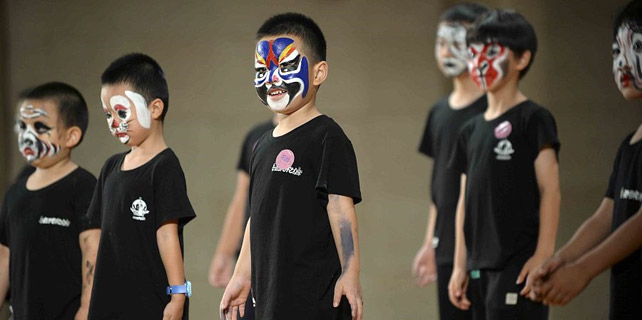China 'has big involvement in Liberia'
Academic/politician who was a student activist says he came back to his country to make a contribution
Liberian footballer-turned-politician-and-academic Augustine Konneh believes eradicating global poverty should be a priority for everyone.
The 57-year-old from one of the world's poorest countries says many in the West do not actually understand what poverty means in reality.
"Our president (Ellen Johnson Sirleaf) was having a press conference one day and she said: 'You know I do not feel good going to bed at night, knowing that there are people in my country living on $1 a day,'" he says.
|
Augustine Konneh says he is impressed by the book, Up and Out of Poverty, containing speeches and articles written by President Xi Jinping when he was Party chief of Ningde prefecture of Fujian province almost 30 years ago. Su Qiang / China Daily |
Konneh was speaking by the pool at the Hilton Addis Ababa after attending the Africa-China High-Level Dialogue and Think Tank Forum: Fighting Against Poverty for Common Prosperity.
He says his country, which was devastated by a civil war which lasted until 2003 and in which 250,000 people were killed, has had its own successes in reducing poverty.
The government, led by Sirleaf, a Nobel laureate who is also Africa's first woman leader, put in place a poverty reduction strategy in 2008 and within three years managed to reduce the number of households that are poor from 68 to 46 percent, according to World Bank statistics..
Some of the work was undone with Liberia, along with Sierra Leona and Guinea, being devastated by the Ebola outbreak. The country ranks 174 out of 187 countries in the United Nations Development Index.
"What Liberia did was revitalize food and agriculture, and then forestry for those who live in the interior. We then rapidly expanded mining."
Konneh is very impressed by a new book, Up and Out of Poverty, containing speeches and articles written by President Xi Jinping when he was Party chief of Ningde prefecture of Fujian province almost 30 years ago, which was a central focus of many of the debates at the forum.
Xi went to the province in 1988 when the prefecture had a GDP per capita of $198 (173 euros; £152). Last year it was $8,000.
"One of the things he (President Xi) says in the book is not to think about small agriculture but think about large and collective agriculture. What President Xi did was make agriculture a priority and to also ensure that young people got involved."
Apart from lecturing in international relations at the University of Liberia in Monrovia, Konneh is also director-general of the Gabriel L. Dennis Foreign Service Institute affiliated to Liberia's Ministry of Foreign Affairs. His job is to teach Liberia's diplomats.
"There are certain things that diplomats need to know in terms of protocol and etiquette. In terms of economic diplomacy, we are a country coming out of war and we need investment. The people we send out to represent our nation are supposed to bring in investors."
Konneh is probably best known as a midfielder in the Liberian national football side which competed in the African Cup of Nations in the 1980s.
"We had a very good team then. When I was playing in some league in the United States, a guy came to me and said he wanted to take me to Germany but I told him I had gone there to go to school.
"I should have probably done like George Weah (a former teammate and now also a rival politician) did and go and make a big load of money but I didn't."
Konneh is also now campaigning for the current vice-president, Joseph Boakai, in this October's presidential election when Sirleaf steps down after two six-year terms of office. The Unity Party candidate faces opposition from, among others, Weah, a former FIFA World Player of the Year who represents the Congress for Democratic Change Party.
"I have actually just come from Lofa county (northeast Liberia) where I have been knocking on doors, like a Jehovah's Witness. Some people can be rude to you but we are attracting a lot of support from young people."
There is speculation that if Boakai wins, he will make Konneh his foreign minister.
"I am not someone who goes out to lobby. I don't do that. I think I am okay where I am. I want to give back what I have. I don't say I want to be this or that. That is not my style, you know, and many people don't understand that."
Konneh, who is the son of a medical doctor, was born in Nimba in northern Liberia, and studied history at Cuttingdon University College in Monrovia, where he was also a student activist.
He was put in jail with a group of other activists and charged with treason by Samuel Doe, the then president who himself suffered a violent death in 1990.
"We were in jail for about two months and they were going to kill us but the American government intervened and we were later pardoned."
Konneh won a Fulbright scholarship to study at Indiana University Bloomington in the late 1980s; and when his country's civil war broke out, he had little choice but to stay in the US, where he then spent most of his career.
He was for a time dean of history at Martin Luther King's old university, Morehouse College in Atlanta.
He decided to return to Liberia a decade ago. His wife, who works for the Liberian mission to the United States, and three children have remained in New York, where he now makes regular visits.
"I was a student activist so I wanted to make sure all the things we talked about came about and I wanted to make a contribution."
Konneh, who had surgery on both knees to deal with the after effects of his playing career, is still stopped in the streets by people who remember him as a player.
"When you walk around people see me and they always call me 'the legend'. The coach of the Liberian football team comes into my office quite often."
Konneh says China has had a major role in the recent development of Liberia, building hospitals, the Samuel Kanyon Doe Stadium, the main football venue, and is currently constructing the $66 million Capitol building in Monrovia, which will house the country's legislators.
Despite Liberia's historic links with the United States - it was colonized by freed American slaves in 1822 - China was the first to respond when the country was hit by the Ebola outbreak.
"The Chinese have a very big involvement in Liberia and our president has described China as a 'friend indeed'," he says.
Although Konneh is supportive of the African Union's 2063 Agenda, particularly in relation to poverty reduction, he believes regional bodies like ECOWAS, or the Economic Community of West African States, have been more effective in fostering development.
"The regional bodies have made more gains than the African Union itself in terms of the policies they have put in place," he says.
Konneh believes the narrative about Africa, particularly in the West, is often too simplistic. He points to The Economist referring to it as the "hopeless" continent in 2000 and then the "hopeful" one 10 years later.
"Africa is a lot more complicated than this binary debate. I think there is certainly hope for the continent, given its growth."
Contact the writers through andrewmoody@chinadaily.com.cn
Bio
Augustine Konneh
Liberian politician and academic
Age: 57
Education
BA in history, Cuttingdon University College Suacoco, Liberia, 1986
MA in history, Indiana University Bloomington, 1989
PhD in history and political science, Indiana University Bloomington, 1992
Career
Assistant and later associate professor, Morehouse College, Atlanta, Georgia, 1992-2000
Adjunct professor, Spelman College, Atlanta, Georgia, 1993-99 and 2000-02
Adjunct professor, Clark-Atlanta University, Atlanta, Georgia, 1999
Professor and chair of history, Morehouse College, Atlanta, Georgia, 2005-09
Lecturer, Ibrahim B. Babangida Graduate School of International Relations, University of Liberia, Monrovia, 2010 to present
Lecturer, African Methodist Episcopal University, Monrovia, Liberia, 2010-present
Director-general, Gabriel L. Dennis Foreign Service Institute, Ministry of Foreign Affairs, Liberia, 2009-present
Book: When China Rules the World: The End of the Western World and the Birth of a New Global Order by Martin Jacques. "For me it surpasses Samuel Huntington's The Clash of Civilizations since it poses the question of what would happen if China really was in charge of the world. I use it in my classes."
Film: Roots (TV mini-series, 1977, dir. Martin J. Chomsky et al)
Music: One Love/People Get Ready, written (with Curtis Mayfield) and performed by Bob Marley. "It talks about peace and unity. Like One Belt, One Road."
Food: Gbasa yama, a soup of meat and fish with cassava leaf and rice.

















